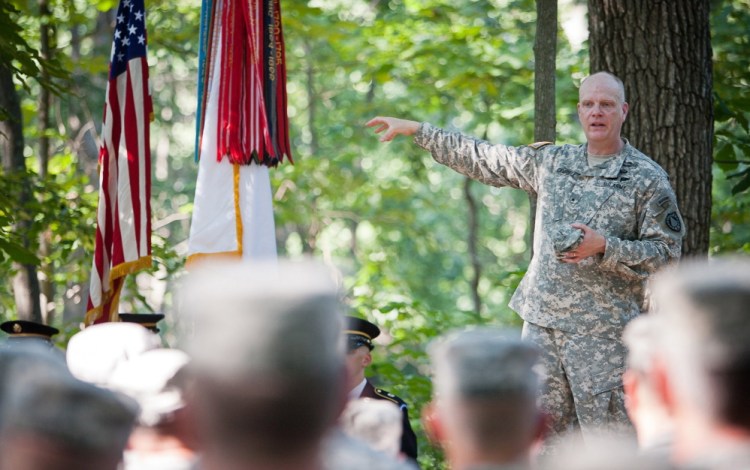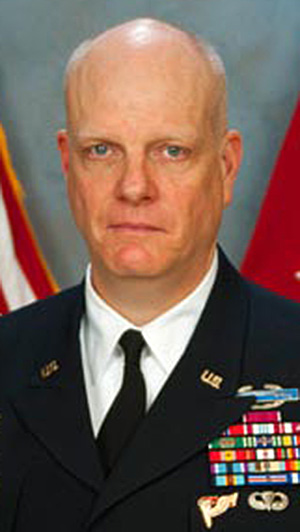AUGUSTA — Gov. Paul LePage fired Brig. Gen. James Campbell, adjutant general of the Maine National Guard, just moments before Campbell was to deliver his annual “State of the Guard” speech to a joint session of the Legislature on Tuesday morning.
LePage said in a brief interview Tuesday evening that he acted after his legal staff reviewed documents sought by the Portland Press Herald related to a proposal to swap the storied 133rd Engineer Battalion for an out-of-state infantry unit.
The governor issued a brief statement announcing the firing shortly before Campbell was to deliver his speech at 11 a.m.
LePage informed House and Senate leaders moments before the speech was scheduled to start. LePage’s office would not say why the governor dismissed Campbell, whose leadership has been under scrutiny since April 2013, when the Press Herald first reported on the effort to exchange Maine’s engineer battalion for an infantry unit.
The governor’s spokeswoman, Adrienne Bennett, would only say that LePage acted on the results of an internal review.
“Based on an internal review of Gen. Campbell, I have lost faith in his ability to lead Maine’s soldiers and airmen who serve so proudly in the National Guard,” LePage said in the statement released by Bennett Tuesday morning.
In a brief interview outside his office as he left the State House Tuesday evening, LePage reiterated that he had lost confidence in Campbell and regretted the timing of the dismissal. But the governor said he felt he had no choice because it would not be right for him to allow Campbell to go forward with the speech to lawmakers, knowing that he was about to dismiss him.
“It’s absolutely a policy matter,” LePage said.
Neither Campbell nor public affairs officials with the Guard responded to calls or emails requesting comment.
The governor appointed Brig. Gen. Gerard F. Bolduc of the Air National Guard to serve as acting adjutant general.
LePage also canceled a press conference he had scheduled for 12:30 p.m. Tuesday to talk about his drug enforcement priorities.
The governor selected Campbell, who also served as commissioner of the Department of Defense, Veterans and Emergency Management, to succeed John “Bill” Libby as adjutant general in August 2012.
Campbell has weathered public criticism, including from former Guard members, for his plans to swap the 133rd Engineer Battalion – and its legacy of community projects and emergency services to Maine people – for an infantry unit from out of state.
Critics were dismayed by the prospect of losing the engineering and construction skills of the battalion, which has forged strong relationships across the state for its work responding to natural disasters and supporting a wide array of community and nonprofit projects. Some said engineering provided more opportunities than an infantry unit for women to learn new skills and earn promotions.
Campbell and LePage first denied that any plan was in the works and blamed others for leaking information, then acknowledged that moving the 133rd was under consideration but only because of federal cuts to the National Guard Bureau proposed by the Obama administration.
Campbell’s undelivered speech to the Legislature, a copy of which was obtained by the Press Herald, makes no reference to the fate of the 133rd.
After the newspaper first reported the general’s plan for the battalion, several Guard members contacted the newspaper to say that the environment at Camp Keyes, the Guard headquarters in Augusta, had become “toxic” under Campbell’s leadership.
The general has consistently rejected requests for interviews, but in comments to other print and broadcast media, he addressed the allegations of poor morale and faulted the media.
“I think if there is any morale issue at headquarters, it has been generated by … unfortunate stories,” he told WGAN Morning News in a May 30, 2014, radio interview. “In an organization the size of 3,500 people, anyone is going to be able to find someone to write a contentious email, and a handful have done that. I think it’s unfortunate.”
That same week, news surfaced that Campbell traveled to Washington, D.C., in the summer of 2013 to make a pitch to swap another unit, the Maine Air National Guard’s 265th Combat Communications Squadron, based in South Portland, for a cyber security unit.
That plan was rejected, but sources told the Press Herald that Campbell went to Washington without LePage’s knowledge.
Military personnel who have served with Campbell described him in a Press Herald profile as intelligent and confident, but also as a polarizing leader who has sought to reshape the Guard for the modern military landscape without always being clear and transparent about how he planned to do that.
Legislative leaders were reluctant to comment on Tuesday about Campbell’s firing.
Assistant House Republican Leader Ellie Espling of New Gloucester said the decision was LePage’s to make.
“We do not know the details that led the governor to make this decision,” she said. “We reserve all judgment and any further comment until these details come to light.”
The Legislature’s bipartisan Veterans Caucus, chaired by Rep. Mick Devin, D-Newcastle, and Rep. Sheldon Hanington, R-Lincoln, released a statement Tuesday afternoon.
“As veterans serving in the Maine Legislature, recognizing we do not have all the facts, we are profoundly concerned by the announcement about the Maine National Guard’s leadership,” the statement said.
The four members of Maine’s congressional delegation issued statements late Tuesday in response to requests for comment, affirming LePage’s authority as commander in chief of the Guard and looking forward to working with new leadership.
Campbell was born in New York and raised in Newton, Massachusetts, but Maine has been his home since he attended Colby College in the 1980s.
He enrolled in the Reserve Officers’ Training Corps while at Colby and, following graduation, served nine years of active duty in the U.S. Army, all in infantry positions. He returned to Maine in 1995 to join the Maine Army National Guard and has had 14 different assignments in the last 19 years.
He also has a master’s degree in European history and a Ph.D. in British history, both from the University of Maine.
Campbell’s military career has been varied, and includes a seven-month tour in Afghanistan from November 2006 to May 2007. Although Campbell was a planning officer, he received the coveted combat infantryman’s badge, reserved for soldiers who have either engaged or have been engaged by an enemy in ground combat.
After Afghanistan, he spent a year at Tufts in a fellowship program. He came back to Maine and was stationed at Camp Keyes for two years in operations and then for two years as the brigade executive officer of a troop command based in Bangor.
When LePage was looking for Libby’s replacement, he actually opened up the application qualifications so that colonels, not just brigadier generals, could apply.
Campbell emerged ahead of other higher-ranking officers. The governor, in a statement announcing the appointment, said he “has distinguished himself as a soldier and a scholar. He is the right man to lead our soldiers and airmen in the years to come.”
Campbell has often referred to the Guard in public comments as the state’s militia. In his first leadership conference when he took over, Campbell summed up the Guard’s missions this way: “We kill people. That’s what we do,” according to officers who were present.
Although Maine Guard units have been deployed multiple times since the Sept. 11, 2001, terrorist attacks, its units have great value in support functions in peacetime. The 133rd, in particular, often assists in civil emergencies such as floods and hurricanes, and also provides significant training opportunities for women, which some fear will be diminished if a transition is made to a combat battalion.
Send questions/comments to the editors.






Comments are no longer available on this story